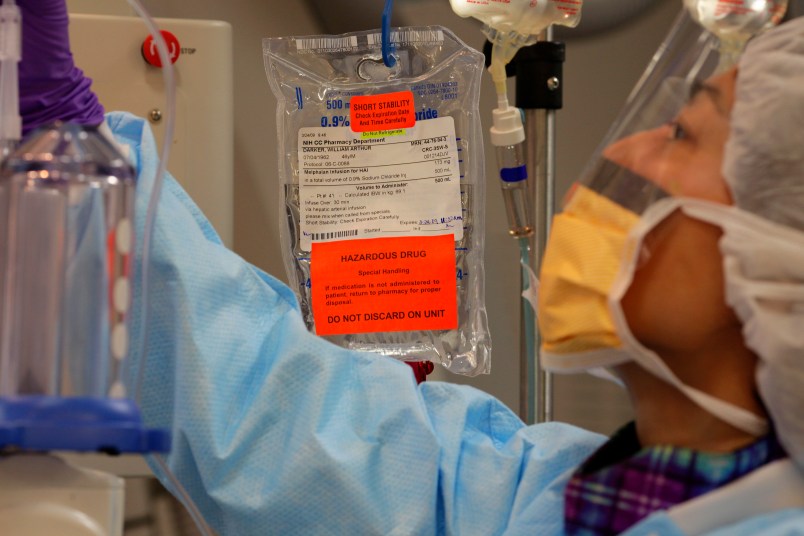CHICAGO (AP) — A cheap, decades-old chemotherapy drug extended life by more than a year when added to standard hormone therapy for men whose prostate cancer has widely spread, doctors reported Sunday.
Men who received docetaxel, sold as Taxotere and in generic form, lived nearly 58 months versus 44 months for those not given the drug, a major study found.
“This is one of the biggest improvements we’ve seen in survival in adults” with any type of cancer that has widely spread from its original site, said Dr. Christopher Sweeney of Dana-Farber Cancer Institute in Boston. He led the study and shared the results Sunday at the American Society of Clinical Oncology’s annual conference in Chicago.
Prostate cancer is the most common cancer in men. In the United States, about 240,000 new cases are diagnosed each year. About 30,000 annually are like the men in this study, with disease that has spread to bones or other organs.
In the study, all 790 men received drugs to block testosterone, a hormone that fuels prostate cancer’s growth, and half also were given six infusions of docetaxel, one every three weeks.
About 2 1/2 years later, 101 of the men given docetaxel had died versus 136 of the men who did not receive it. One man died from the treatment, and about 6 percent had fevers from low blood counts, but most were able to tolerate treatment well, Sweeney said.
The National Cancer Institute paid for the study, which took nearly a decade to do. The result shows the importance of federal funding for research that otherwise might not get done, said Dr. Clifford Hudis, who works at Memorial Sloan Kettering Cancer Center in New York and also is the president of the oncology society.
“These are often studies that industry is less interested in funding, such as a new use for an old drug” that lost patent protection long ago, he said.
Generic docetaxel costs about $1,500 or less per infusion. That’s far less than some other cancer drugs, which can exceed $100,000 for a course of treatment.
___
Online:
Cancer info: http://www.cancer.net and http://tinyurl.com/o5p6ahb
___
Marilynn Marchione can be followed at http://twitter.com/MMarchioneAP
Copyright 2014 The Associated Press. All rights reserved. This material may not be published, broadcast, rewritten or redistributed.







58 months instead of 44 months may seem like a trivial gain, but every day counts to the patient and the patient’s family. This is promising news.
As someone who has dealt with cancer myself (not prostate…well not yet anyway) 14 months that wouldn’t have been there otherwise is good news. But the back side of this question …what quality of life did these guys with advanced cancer have? That’s something I think about often. Hearing your doctor utter the words “you have cancer” are not the easiest words to hear.
Good news, but at $1500/dose “cheap” is an adjective in need of another adjective, like, “relatively”.
As to quality of life, that is a critical question whose answer almost certainly varies from patient to patient.
Quality of life doesn’t get enough respect. My dad got excellent medical care and probably live 6 years longer because of it. But that last year was so bad he really, really wanted to die.
The article says 6 infusions of the drug at 3 week intervals, but cursory mention of the side effects. Even if the infusions made you sick as a dog, that’s sick for 4.5 months to gain 14. Sounds like a good bet to me.
The article makes a point about government funding for studies like this where industry sees no profit.
This reminds me of some odd things that happened to some generic drugs during the Bush administration. 1) Quinine tablets were removed from the market because there was something newer, supposedly better, and definitely expensive. 2) Guaifenesen, a very old, cheap generic drug became an expensive, monopoly-controlled non-prescription drug when the NIH apparently made a deal with a drug company to test it, and then own it. 3) The standard Albuterol rescue inhaler for asthma was reformulated with a different more Eco-friendly propellant; and also became a much more expensive drug controlled by a monopoly. These are just the cases I heard about or experienced myself. I wonder how many generics actually disappeared or were returned to designer status. I also wonder what the fate of that “cheap” Docetaxel will be as soon as some drug company has an expensive product with the same uses, and a friend in an administration.